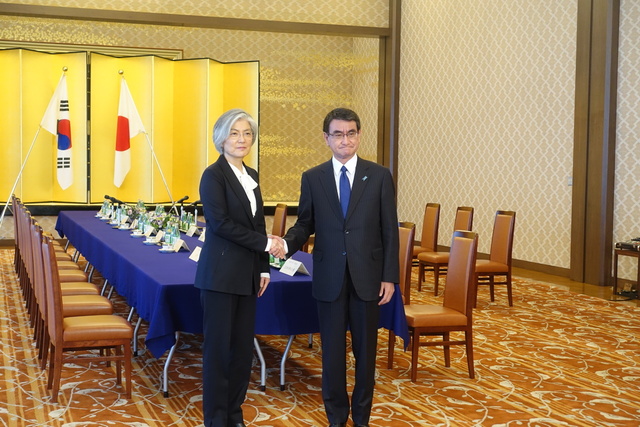 |
|
South Korean Foreign Minister Kang Kyung-wha shakes hands with Japanese Foreign Minister Taro Kono prior to their summit on Dec. 19.
|
The Japanese government continues to insist that Seoul implement terms of 2015 agreement
South Korean Foreign Minister Kang Kyung-wha delivered an explanation to Tokyo on Dec. 19 on the progress of a report to be delivered on Dec. 27 by a task force examining the two governments’ Dec. 2015 agreement on the Japanese military comfort women issue. Kang’s visit to Japan was her first since taking office. With Japan refusing to back down on its insistence that South Korea follow the terms of the agreement, differences between the two sides remained tense. Following a meeting with Prime Minister Shinzo Abe that afternoon at his official residence in Tokyo’s Nagatacho district, Kang said she had “talked about many things regarding the comfort women agreement review task force report during a morning meeting with Foreign Minister Taro Kono.” “My understanding is that Prime Minister Abe received a report through Minister Kono. Prime Minister Abe spoke about the Japanese government’s basic position,” she added. Neither side’s references to the task force report are included in materials issued by the South Korean government on Kang and Abe’s meeting. But a statement released by the Japanese government said that “Abe explained once again that it is important for South Korea to faithfully carry out the [2015] agreement.” The Japanese government said that “Kang explained the talk about a task force reviewing the comfort women agreement and said she wanted to keep working to build forward-looking relations with Japan.” “While relations between our two countries were strained when this year began, they have moved in a positive direction since Moon Jae-in’s inauguration as president through communication and frequent meetings with Prime Minister Shinzo Abe. It’s important for South Korea and Japan to cooperate closely on the North Korean issue,” Kang said at the beginning of her meeting with Abe. “South Korea is our most important neighbor, and it shares our strategic interests. We face several challenges, but we can build future-oriented relations while carefully managing those challenges,” Abe said. After the meeting, Kang said she had communicated a verbal message from Moon expressing his hope that Abe will attend the Pyeongchang Winter Olympics. When asked whether Abe had responded, Kang said, “There hasn’t yet been any discussion of a specific schedule. Prime Minister Abe replied that while he has engagements in Japan, the Japanese will do their best to ensure that the Pyeongchang Olympics are a success.” On the morning of the same day, Kang met with Japanese Foreign Minister Taro Kono. “I told Foreign Minister Kang that it was important for our 2015 agreement about the comfort women to be faithfully executed,” Kono said. “Our two governments declared that the comfort women agreement two years ago was final and irreversible, and it is also highly regarded by the international community. We ask South Korea to faithfully and persistently implement the agreement,” said Chief Cabinet Secretary Yoshihide Suga. South Korea’s Foreign Ministry said that during Kang’s meeting with Kono she briefly explained the developments surrounding the task force reviewing the Dec. 28 agreement and urged Japan to quickly and faithfully implement follow-up measures related to its registration of early modern industrial facilities with UNESCO’s Memory of the World. When Japan historical registered sites from the industrial revolution during the Meiji era in Japan with UNESCO in 2015, it promised to also explain the harm caused to Koreans who performed slave labor at Hashima Island (Battleship Island) and other sites. But the Japanese government recently submitted a plan to UNESCO to build the explanatory center in Tokyo, 1,200km away from Hashima Island. South Korea’s Foreign Ministry also reported that Kang told Kono, “We must work together so that our two countries can develop a future-oriented, mature partnership, while dealing suitably with matters such as the follow-up measures for registering Japan’s early modern industrial facilities with Memory of the World.” This appears to have underlined the Moon administration’s “two track” approach, by which it seeks to deal with historical issues separately from its relations with Japan. By Cho Ki-weon, Tokyo correspondent Please direct questions or comments to [english@hani.co.kr]






